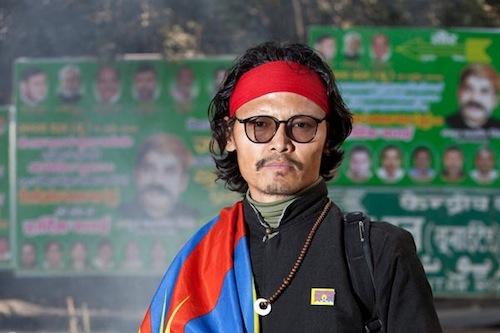
I am often asked if I consider myself a "Tibetan poet" and if I write about "Tibetan things." To explore the possible identities and characters within reach, I rephrase and translate the questions: Are the poems political? Are the poems personal? Are the poems addressed to a particular audience? Will the reader feel excluded from the place, space, and language of the poem? Are the poems written to be understood?
I fear my answers will be influenced by the contents of the spices in my morning tea, or by the precarious roots of dandelions rioting at the edge of the square where local farmers gather in Santa Cruz on Wednesday afternoons, or the abrasive heat of polyester worn by the traveller beside me, or the color of a wooden gate that reminds me of other entrances in other places. All of these possibilities, however, might be catapulted into some irrelevance if news comes of another self-immolation inside Tibet, because this event will bring all questions face-to-face with the realization that we also remember what we cannot forget. Or, that we forget so we can remember.
In the poem "Refugee" from the 2002 collection Kora, Tenzin Tsundue, a poet living in Dharamsala, India, writes:
When I was born
My mother said
you are a refugee.
In Tsundue's poem, the word "refugee" is not defined for the speaker. It is given to him as though it was always there. The word is a sign, it is a menace, it is an enigma, but so is the world that gives the word its place. Do we read "refugee" as a noun, an adjective, a trope, or a state of mind? What changes or shifts with each reading? Does it matter, and why, and to whom?
The word is malleable, and as a product of the world, the word travels. It is translatable, it gives when prodded, and it becomes. Defined for the speaker as fate and identity, the word is transformed by him to become something else. In the same poem, Tsundue concludes:
I am born refugee.
I have three tongues.
The one that sings
is my mother tongue.
The R on my forehead
between my English and Hindi
the Tibetan tongue reads:
RANGZEN.
The speaker takes a definition (af)fixing him to one mode of being and disperses the word into a different future: R, the letter that sentences the self to a particular imprisonment, or condition of exile, is transformed into an R that announces its freedom. The R becomes revolutionary: "rangzen" is the Tibetan word for freedom. It's a good reminder to me that such encounters and dispersals are good starting places to attempt to tell, or to re-tell the "about-ness" of a text.
Poet Tsering Wangmo Dhompa’s parents fled Tibet in 1959. Raised by her mother in Tibetan communities...
Read Full Biography

